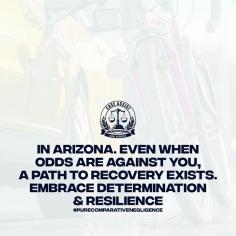Comparative Negligence: Arizona follows a pure comparative negligence rule in personal injury cases. This means that even if you're found to be mostly at fault for your injury, you can still recover damages. However, your compensation would be reduced by an amount equal to your percentage of fault. For example, if a plaintiff is 90% at fault and the total damages are $100,000, they can still recover $10,000 (10% of the damages).
For additional insight on personal injury law in the state of Arizona. Be sure to send us a message or visit our website.
@caseassist
Reference(s):
1. Arizona State Legislature, 12-2505. Comparative negligence; definition, retrieved from: https://www.azleg.gov/viewdocument/?docName=https://www.azleg.gov/ars/12/02505.htm
*Note: Through the rulings in higher courts (including federal decisions), the passage of new legislation, ballot initiatives etc. Laws governed by the state are always subject to change. While we work hard to offer the most up to date details as possible. We highly recommend consulting with an attorney or conducting your own legal research, to confirm the law(s) within your state.


